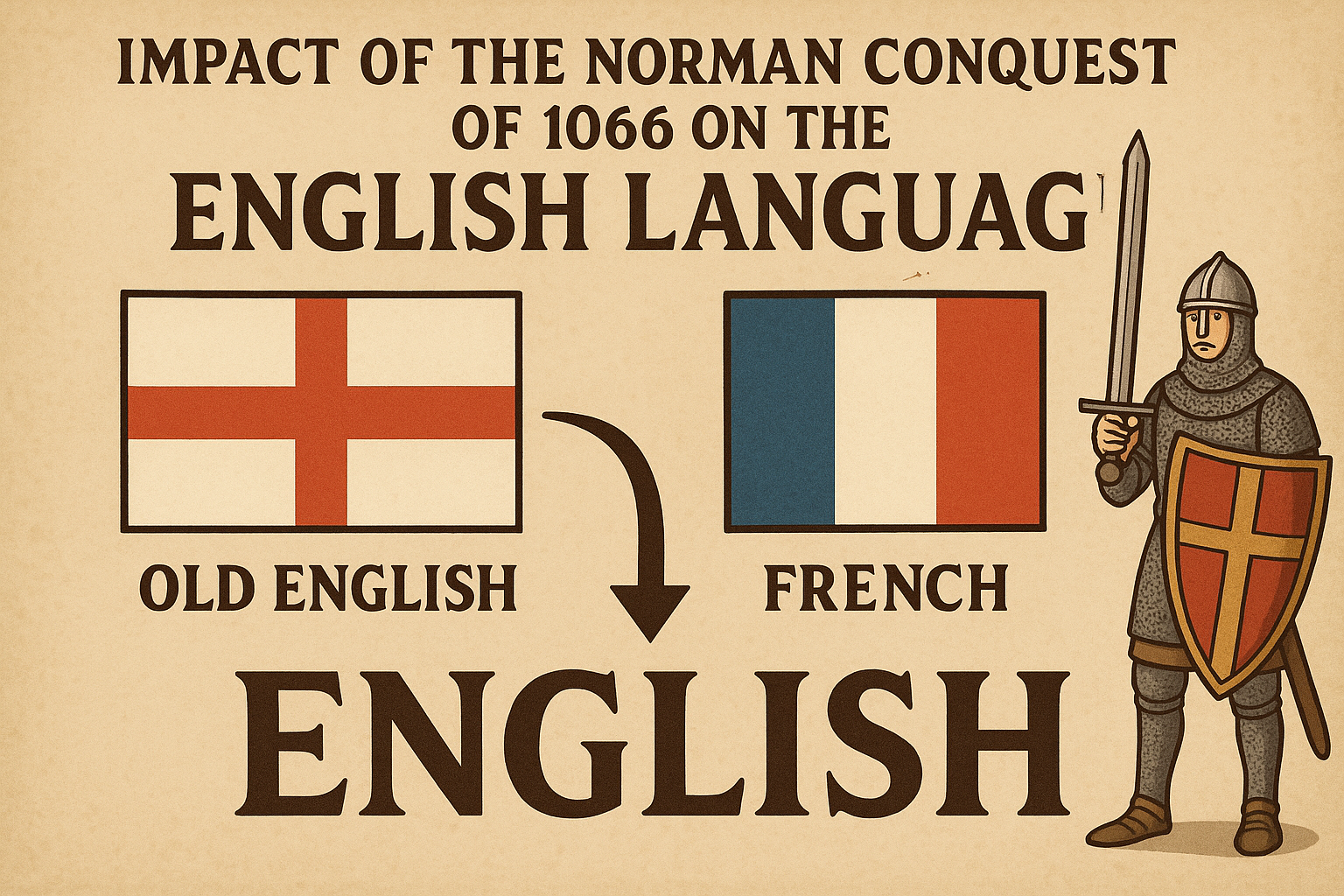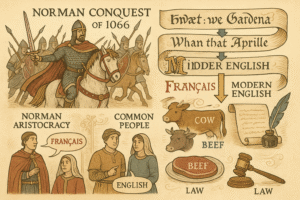The Norman Conquest of England in 1066 is considered to be one of the most important moments in the development of English language. This event not only changed the political environment that was England as well, but it had major consequences for the country’s society, culture and most importantly its language. The Norman conquest brought a new elite class who was fluent in Norman French which resulted in a radical change in English. This article will examine the numerous impacts on Norman Conquest on the English language. Norman Conquest on the English language, with a particular focus upon the introduction of French vocabulary and the shift between Old English to Middle English and the stratification of language into social groups as well as the disappearance of grammatical gender and the long-term impact on linguistics which continues to be felt even in the present day English.
Historical Background
To fully comprehend the linguistic shifts that came after with the Norman Conquest, it is important to look at its historical background. In 1066 William the Conqueror, known as the Duke of Normandy came to England to defeat the King Harold II in the Battle of Hastings. The victory was the beginning of Norman dominance in England which brought an class of aristocracy who was fluent in Norman French. The Normans were initially Scandinavian colonists who adopted their Old French language and culture Their conquest brought the Normans with a new influence on language that forever changed the direction of English.
The Influx of French Vocabulary
One of the earliest and obvious results from the Norman Conquest was the introduction of a variety of French vocabulary into the English language. This was especially evident in the areas of law as well as the governance of art, literature and food. In the ruling classes, made up of Normans were able to speak French as their main language. As consequently, many French phrases were incorporated into English.
For instance, the legal language was transformed in a major way. The words “court,” “judge,” “jury,” “plaintiff,” and “defendant” were borrowed from French in order to reflect the modern legal system that was imposed on the Normans. In the same way, terms relating to governance, including “government,” “parliament,” and “sovereign,” also entered the English language in this time. Its influence on French expanded onto the fields of art and cultural fields as well, with terms such as “music,” “dance,” “poetry,” and “literature” becoming part of the English vocabulary.
In the world of cooking The distinction between animals that were raised to eat in addition to the meal itself became apparent by the use terms from French terms. For example it was there was an Old English word for cow was “cu,” while the French term used for beef was “boeuf.” This double language not only shows the social structure that existed at the time, however also shows how the language changes as a result of cultural changes and shift of Old English to Middle English
Prior to the Norman Conquest, the English language was mostly Old English, a Germanic language with a complicated inflection system and an array of dialects. Old English was heavily influenced by Old Norse due to Viking invasions, however the arrival of the Normans brought the complexity of a new language. The introduction of French vocabulary as well as influences of Normans and the Norman ruling class facilitated the gradual change between Old English to Middle English.
The transition from Old English to Middle English was marked by an improvement in the syntax and grammar. Old English depended on inflectional ends to communicate the grammatical relationship, for example numbers, case, and gender. But as French vocabulary became more widespread, English began to adopt more of an analytic style, which relied on word order instead of inflections to convey the meaning. This change made English more accessible to native speakers and helped in the development of an improved, standardized version of English.
Social Stratification of Language
The Norman Conquest also established a distinct social stratification of the language in England. The upper classes used Norman French, while the majority of people spoke English. This led to a triglossic culture, where three languages coexisted. English for the everyday people, French for the aristocracy along with Latin to be used by the church and academic pursuits.
The stratification of social class affected the language of English. A number of concepts used dual terms that reflected the social order. For instance”mutton” was an example of a dual concept. Old English word “sheep” was a common term used by people, whereas the French-derived word “mutton” was used by the elite. This is commonly described as “doublets,” where two words that have similar meanings are used on the tongue, with one having Germanic origin and the second from French origin.
The language was used as a sign of position, with the upper classes making use of French to prove their status and to assert their power. The linguistic divide exacerbated social hierarchy and created a feeling of distinction between classes. However, over time influences of French started to spread across all levels of society which led to an increasing blending of both languages.
Loss of Grammatical Gender
Another important consequence that The Norman Conquest on the English language was the disappearance of gender-specific grammatical. Old English had a complex system of grammatical gender which classified nouns as feminine, masculine or neutral. This was evident in the inflectional endings for pronouns and nouns as well as adjectives.
The advent of French which did not have a formal gender system, was a factor in the gradual demise of this aspect in English. As the language developed to become Middle English, the distinctions between feminine and masculine nouns were less distinct and the inflectional endings which indicated gender were generally removed. This simplified language made English simpler and more sim
ple to master, but the language also represented a change from the complexity of linguistics in Old English.
Long-term Linguistic Impact
The impact on the Norman Conquest on the English language can be seen today. The huge expansion of French vocabulary is a legacy that has lasted for a long time and is estimated to comprise 30% of the modern English terms derived from French. This influence is most evident in fields of specialization such as government, law and the arts in which French words are still widely used.
Additionally, the shift to Old English to Middle English set the stage for the evolution into Modern English. The simplifying of grammar and syntax and the
mixing of languages, helped create the rich and varied the linguistic landscape we are seeing in the present. The development of English has been ongoing over the years, and has incorporated elements from a variety of languages and cultures. However, the fundamental changes triggered with the Norman Conquest remain a crucial element of its historical.
Conclusion
In sum the Norman Conquest in 1066 had a profound and lasting effect in the English language. Introduction of French vocabulary and the transition to Old English to Middle English and the stratification of languages as well as the demise of gender based grammatical distinctions, and the long-term effects of linguistics each contributed towards the development of English. This historic event did not just change the way that English was spoken but also revealed the larger social and cultural shifts that were occurring in England during the time. The impact from the Norman Conquest continues to shape the English language and make it a vibrant and dynamic medium of communication that has a rich time. Understa
nding the evolution of English helps us understand the complex web of influences that have helped to shape English into the international language we have now.




Pingback: 10 Fascinating Cultural Traditions Around the World That Still Thrive Today - addlevelup
Pingback: How Cultural Clothing Reflects History and Society: Understanding Its Impact - addlevelup